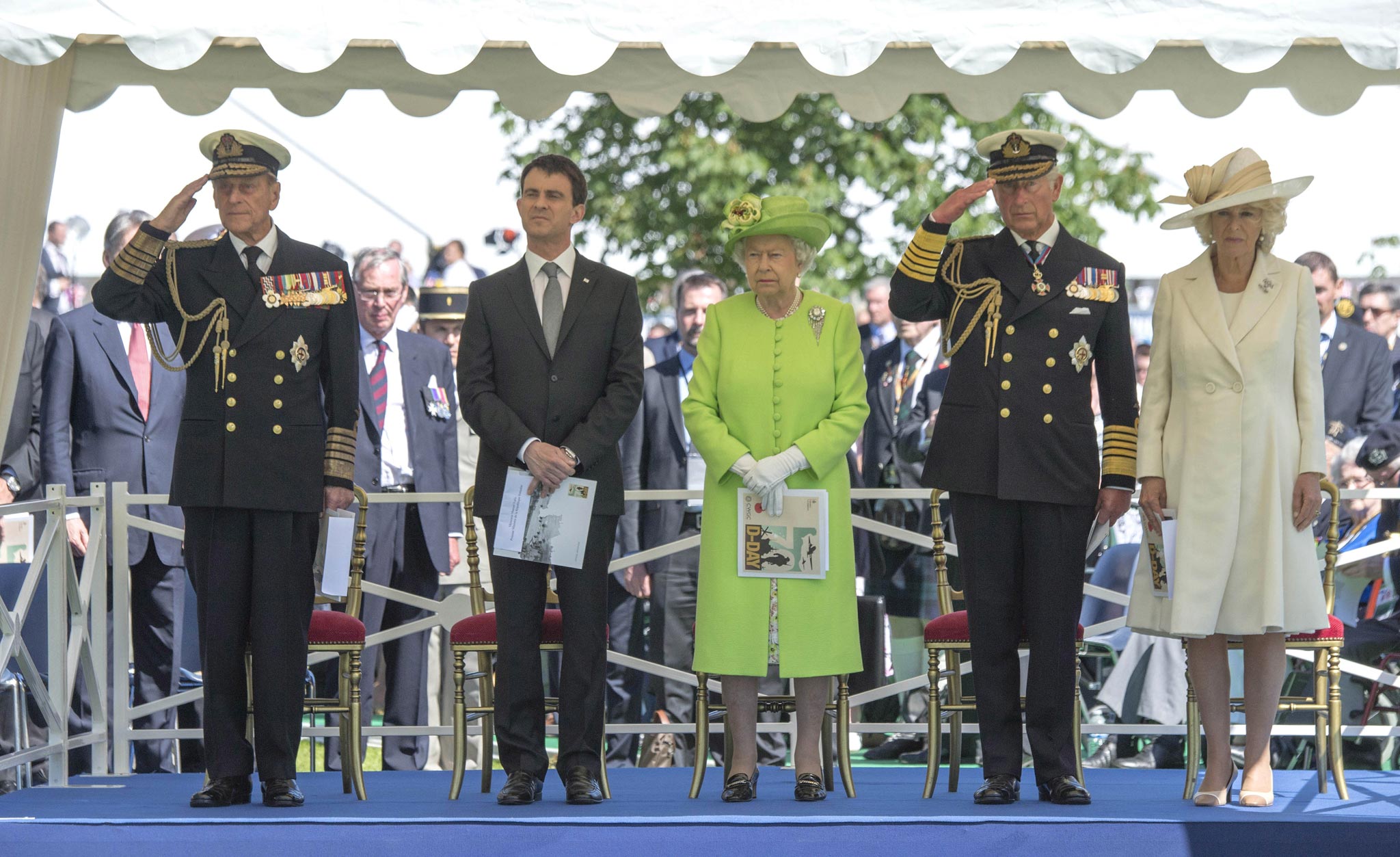D-Day 70th anniversary: Queen leads British commemoration

Over 300 British veterans of the battle of Normandy – one in four of those still alive – joined the Queen in a war cemetery in Bayeux today to commemorate the 70th anniversary of the D-Day landings.
Four British World War Two aircraft, a Lancaster, two Spitfires and a Dakota, flew low over the cemetery the very second that the Queen entered the main gate – a piece of organisation and timing worthy of D-Day itself.
The Queen, dressed in a high-visibility lime green coat and hat, laid a wreath for the 22,000 British and Commonwealth soldiers who died in the three-month campaign which followed the seaborne invasion of the Norman coast on 6 June, 1944.
Earlier, hundreds of people lined the streets of Bayeux to applaud and cheer the British veterans as they made their way – many in wheelchairs, others on foot – from the town’s cathedral to the largest Commonwealth war cemetery in Normandy. The ceremony, organised on 6th June every year by the British Legion, was also attended by the Duke of Edinburgh, the Prince of Wales, the Prime Minister, David Cameron, the deputy Prime Minister, Nick Clegg and the French, Australian and New Zealand prime ministers.
Ted Hoskin, 88, from Plymouth, who was a “boy sailor” on a hospital ship off the Norman coast on D-Day said: “Do you know, this is the first time I have been back in all these years? I wanted to come back before it was too late. To have the Queen here too – and all these people cheering us – has made it a wonderful day. A sad day, but a wonderful day.”
Around 400 Commonwealth Normandy veterans – including about 50 from Australia and New Zealand – sat in a circle around the Cross of Remembrance, the superimposed sword and crucifix which stands in every Commonwealth military cemetery. The Queen laid a wreath, followed by the French prime minister, Manuel Valls.
The Bayeux war cemetery contains 4,648 graves, including 3.935 British soldiers – almost a quarter of the 17,000 British troops who died in Normandy between 6 June and 20 August 1944. On the ceremonial arch beside the cemetery entrance are, engraved the Latin words “Nos a gulielmo victi victoris patriam liberavimus”: “We, who were conquered by William, have liberated William’s homeland.”
The cemetery, one of the most beautiful of the many Commonwealth war cemeteries in France, looked even more resplendent than usual today. Every single gravestone has been replaced in the last few months – part of a drive by the Commonwealth War Graves’ Commission to prepare cemeteries for the D-Day and World War One anniversaries.
The turnout of British veterans was the largest since the 60th anniversary of D-Day in 2004. It is estimated that there are now only 1,200 British Normandy veterans, and maybe 500 British D-Day veterans, still alive.
A good proportion seemed to have found their way to Bayeux today, many surrounded by children and grandchildren. Every man had a story to tell.
Geoffrey Moss, 89, from Gloucester, was one of the first British soldiers ashore on Gold Beach, with the Durham Light Infantry at 7am on 6 June 1944.
“Someone was killed to the right of me. Someone was killed to the left of me. Somehow I survived,” he said. “We fought our way three miles inland that day. I had a second lucky escape. I was assembling one of the bicycles they had given us when a bullet struck the frame and deflected away. Even the bicycle wasn’t hurt too badly.”
The Queen and the Prime Minister chatted with veterans after the service.
Earlier, as he arrived, Mr Cameron, approached at random a member of the crowd.
“Where are you from?” Mr Cameron asked. “From Belgium,” the man said. “From Belgium, ah…” said the Prime Minister, evidently disappointed. No votes there then. He shook hands warmly and walked on.
Join our commenting forum
Join thought-provoking conversations, follow other Independent readers and see their replies
Comments
Bookmark popover
Removed from bookmarks